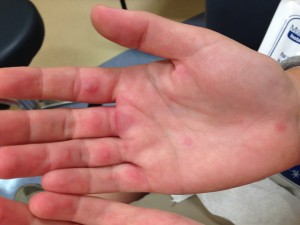I’m an academic and an educator. When I was diagnosed with breast cancer, I chose to be treated in a university setting. It felt right to me, that if I had to go through the experience of breast cancer, that my body would become a teaching tool. It helped provide some form of meaning to the experience. It is with this lens that I found myself regretting not calling out to the clearly first-rotation medical student while in the emergency room.
I sat on a chair, ice packs on my hands to reduce the pain from the blisters which brought me to the emergency department – toxic erythema secondary to chemotherapy. In the five hours I was there, I had consultations with an internal medicine resident, oncology resident, on-call oncology fellow, dermatology resident, on-call dermatology fellow, dermatology attending and the emergency room attending. The emergency room attending was being shadowed by a wide-eyed and yet shy medical student.
Looking back on the experience a year later, the educator in me has only one regret. I regret not explicitly offering the medical student an opportunity to feel the lump in my breast. At the time, I didn’t realize that the lump was temporary. I was undergoing neoadjuvant chemotherapy. Within the first two months of chemotherapy, the lump that I found during my daily breast exam while showering would slowly melt away, to the point where it could no longer be felt. I would mark the success of chemotherapy by how the very thorough radiation oncology fellow was unable to detect the lump on his physical exam. I had no idea just how temporary the cancerous lump would be. And so, I find myself wondering, had I offered up the lump in my breast as a teachable moment, would that medical student have become a better doctor?






